 Image search results - "Oshima" Image search results - "Oshima" |
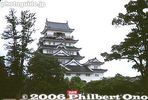
Fukuyama Castle tower
|
|
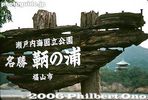
Sign for Tomonoura. Tomonoura is a National Important Traditional Townscape Preservation District (重要伝統的建造物群保存地区).
|
|

Fukuyama Castle tower
|
|

Ferry between Tomonoura and Sensui island.
|
|
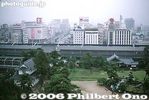
View from castle tower
|
|
|
|

Fukuyama Castle from the train
|
|

Bentenjima island near Tomonoura.
|
|
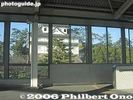
Fukuyama Station (shinkansen)
|
|
|
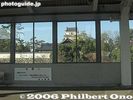
Fukuyama Station (shinkansen)
|
|
|
|
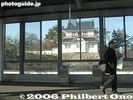
Fukuyama Station (shinkansen)
|
|
|

Fukuyama Station (shinkansen)
|
|

JR Sugamo Station on the Yamanote Line. 巣鴨駅
|
|

In front of JR Sugamo Station
|
|

Main road in front of JR Sugamo Station
|
|

Cherry blossoms near JR Sugamo Station
|
|
|
|

Okinoshima in sight
|
|

Misty Okinoshima
|
|

Entering Okinoshima Port. Okishima is the largest island in Lake Biwa. MAP
|
|
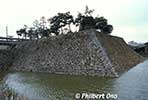
Mihara Castle tenshu main tower foundation and moat. No buildings remain.
|
|
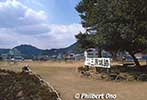
A park on top of the Mihara Castle site.
|
|
|

Side of boat
|
|

Okinoshima Port
|
|

Okinoshima Port and boat schedule
|
|

Okishima Port
|
|

Sea wall
|
|
|
|
|

Shore road
|
|

Steps to the larger hill
|
|

Neck of Okishima.
|
|

Okinoshima Port
|
|

Narrow alley
|
|

Renmyo was here.
|
|
|
|
|
|

Sakurajima 桜島Part of Kirishima-Yaku National Park.
|
|
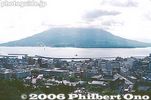
View of Sakurajima from Shiroyama ParkNotice the submarine in the water.
|
|
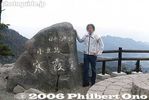
Kankakei Gorge marker and lookout 寒霞渓
|
|

Aoshima in the distance.
|
|

Entrance to Sugamo Jizo-dori shopping street 巣鴨地蔵通り商店街
|
|
|
|
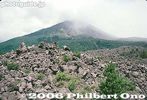
Sakurajima 桜島
|
|

View from Shiroyama Park
|
|
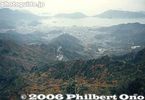
View of Kankakei
|
|
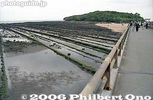
Bridge to Aoshima.
|
|

Sugamo Jizo-dori shopping street 巣鴨地蔵通り商店街「おばあちゃんの原宿」
|
|

Leaving Okinoshima (we'll be back).
|
|

View from the slope
|
|

What's a submarine doing in Kagoshima?
|
|
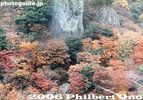
Autumn colors seen from the ropeway.
|
|

Straight rows of layered rock.
|
|

The clothing shops are geared for elderly women. Sugamo is the fashion capital for elderly women. 「おばあちゃんの原宿」
|
|
|
|

Walking paths near the mountain.
|
|
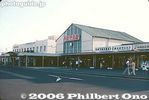
JR Nishi-Kagoshima Station in the 1980s.The station is now called Kagoshima Chuo Station.
|
|
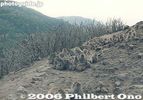
Monkeys
|
|

Aoshima Shrine torii and Devil's Washboard, Miyazaki
|
|

Nakasendo road marker.
|
|

Misty Omi-Hachiman coast
|
|
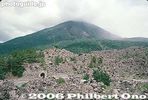
Sakurajima, Kagoshima. Part of Kirishima-Yaku National Park. 桜島
|
|

Foggy Okayama Port and ferry from Shodoshima. 岡山港
|
|
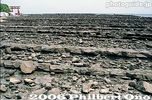
Aoshima Shrine torii and Devil's Washboard, Miyazaki 青島
|
|

Most of the clothing items are price low, around 1,000 yen which might be affordable by people living on social security.
|
|
|

Leaving Sakurajima across the bay.
|
|
|

Hat shop
|
|
|
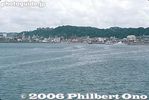
Kagoshima port
|
|

Marvelous contrast between the torii and layered rock.
|
|

Sugamo Jizo-dori shopping street 巣鴨地蔵通り商店街
|
|
|
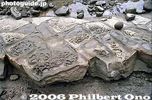
Close-up of rock
|
|
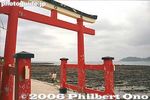
Aoshima Shrine torii
|
|

Aoshima Shrine torii
|
|

Entrance to Hiroshima-Nagasaki photo exhibition 広島・長崎原爆写真展の入口
|
|
|
|
|

Aoshima Shrine, Miyazaki
|
|
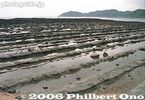
Aoshima's Devil's Washboard
|
|
|
|
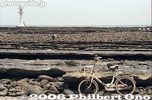
Not my bicycle
|
|

Trail around the island
|
|
|
|
|
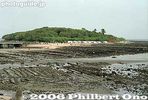
Aoshima from a distance.
|
|
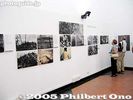
Hiroshima photos 広島原爆写真
|
|
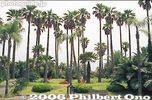
Tropical Plant Garden 亜熱帯植物園
|
|

Kōgan-ji Temple (高岩寺)
|
|

Tropical Plant Hothouse 熱帯植物観賞大温室
|
|

Gate to Koganji temple, a famous spot along the shopping street.
|
|

熱帯植物観賞大温室
|
|

Koganji temple. The temple's popular name is "Togenuki Jizo-son." It sells magic paper called osugata which supposed to remove a thorn or splinter from your skin. Affix it to the thorn and it will be extracted. とげぬき地蔵尊
|
|
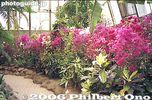
熱帯植物観賞大温室
|
|

Togenuki means thorn-extracting. Koganji temple incense burner
|
|

熱帯植物観賞大温室
|
|

Koganji temple Hondo hall. This is a Zen temple belonging to the Soto-shu school. The temple was founded in 1596 and moved to Sugamo in 1891.
|
|
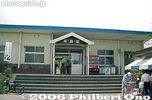
Aoshima Station 青島駅
|
|

Inside Koganji temple Hondo. The temple houses the Togenuki Jizo statue which is not visible to the public.
|
|

Grounds of Koganji temple as seen from the Hondo hall.
|
|

People line up to wash the famous Kannon statue. The line gets longer on weekends.
|
|

People in line for the Arai (Washable) Kannon statue. Anybody can line up and scrub the statue. No charge.
|
|

Arai Kannon statue. Wash the part of the body to cure the corresponding part of your own body. 洗い観音
|
|

Hiroshima panorama photos by Shigeo HayashiThe exhibition room was divided in half by this panel. The right side was for Hiroshima, and the left side for Nagasaki.
|
|

They used to have a tawashi brush to wash the statue, but that wore out the statue. So the replacement statue is now washed/rubbed with a towel instead.
|
|

Jizo statue
|
|

Jizo statue
|
|

People relax in front of the temple.
|
|
|
|
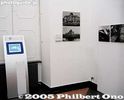
Video monitor showing Hiroshima
|
|
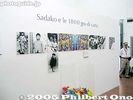
Sadako and her origami cranesBased on a story of a girl named Sadako who was exposed to the atomic bomb in Hiroshima. She was told that if she folded 1,000 paper origami cranes, she would be granted a wish. But she died at age 12 even after folding over 1,000 paper cranes.
|
|

The shopping street is quite long, going all the way to Nishi-Sugamo on the Mita subway line.
|
|
|
|

The famous red underwear. Supposed to keep you warmer. For men and women.
|
|

Umbrella shop
|
|

Tokyo Toden streetcar, Koshin-zuka Station.
|
|

My lunch. Ball-shaped gyoza. The skin is slightly crunchy.
|
|

Inside the gyoza restaurant are placards written by past customers boasting the number of gyoza they ate (or couldn't finish).
|
|

Nagasaki photos by Yosuke Yamahata 山端庸介が原爆投下翌日の写真を撮ったYosuke Yamahata was an Imperial Army photographer who was ordered to go to Nagasaki to photograph the after effects of the atomic bomb. He and two others, a writer and an artist, arrived in Nagasaki the morning after the bomb was dropped. Yamahata went on to capture over 100 extraordinary images of the devastation, people who survived, people helping the wounded, and the inevitable corpses.
山端庸介(1917−66)は陸軍報道カメラマンとして原爆投下翌日の長崎に入り,100枚以上の非常に貴重な歴史的の写真を撮った。長崎原爆資料館にも大きく展示されている。
|
|
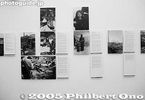
Nagasaki photos by Yosuke Yamahata. 写っている人物の当時の状況が詳しく語っています。In 1995, NHK, Japan's leadning TV station, successfully identified some of the survivors pictured in Yamahata's photographs. They even interviewed some of them who were still living. They aired a special TV program and published a book about the extraordinary stories of the survivors.
Those stories have been summarized into Italian for the photo captions in this exhibition.
写っている人物の当時の状況が詳しく語っています。10年前にNHKの取材班が山端庸介の原爆写真に写っている人物の名前とか所在を調べてまだ生きている何人かとインタービューが成功。それが、テレビ番組と本「NHKスペシャル 長崎 よみがえる原爆写真」になって大変感動しました。(テレビ番組も昨年8月に再放送された。)
そのNHK Special番組と本を参考してこの新しい写真集の写真説明文を書きました。イタリア語になっていますが、それぞれの写真を今まで外国語で詳しく説明されたことないのです。被爆者の感動的の話しをもっと海外にも伝いたいのです。
|
|

Nagasaki photos by Yosuke Yamahata
|
|
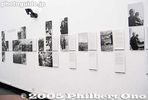
Nagasaki photos by Yosuke Yamahata
|
|

Nagasaki photos and origami corner 折り紙コーナーVisitors were encouraged to fold a paper crane.
|
|
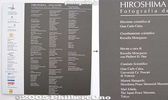
Panel for exhibition credits クレジットRossella Menegazzo and Philbert Ono were co-curators of the photo exhibition.
イタリア側でこの展覧会と図録のコーディネートをしているRossella Menegazzoさんは、ちょっと古い友人です。彼女は素晴らしい頑張りやさん。まだベネチア大学の学生のとき、夏休みに来日して僕と会いたいと言われて都内のピザ屋(彼女のバイト先)で初めて会ってあげた。
「卒業論文のため、日本人の写真家を研究したい!」と言い出してびっくりしたよ。「木村伊兵衛か土門拳、どっちがいいと思う?」と聞かれても答えないよ。(結局、土門拳になった。)しかし、参考書はほとんど日本語で英語の参考書も(僕のHP以外)非常に少ないと指摘した。でも3年後、なんとイタリア語で土門拳の論文が完成された。これは、イタリア国内で史上初の日本人写真家の論文である。ということは、彼女が日本語も勉強して読めるようになったの。凄いでしょう。
で、話しがまだ続く。彼女の草分けの論文のおかげで大学の後輩も二人、三人が日本の写真家の論文を書いたりしているの。その後輩たちにも僕ができる限り参考書など送っています。(向こうは喜ぶね。)でも、その学生さんが日本人の写真家を論文のためにインタービューしようとすると拒否されることがある(例えば奈良原 一高)。それを聞くと僕はとても恥ずかしい気持した。一方、森山大道の論文を書いた学生が本人とのインタービューが成功した。彼女がとても喜んでいたそうです。(大道さん、ありがとう。)
|
|

Nagasaki exhibition catalog: Yosuke Yamahata-Nagasaki 山端庸介の新しい写真集兼図録This book shows all of Yosuke Yamahata's photos of Nagasaki, including the the 100+ photos of Nagasaki taken on the day after the bomb was dropped. The book includes a photo which has never been published in a book. Many detailed captions about the people identified in the photos are also included. Language is Italian. Order from PhotoGuide Japan's iStore.
山端庸介(1917−66)は陸軍報道カメラマンとして原爆投下翌日の長崎に入り,100枚以上の非常に貴重な歴史的の写真を撮った。長崎原爆資料館にも大きく展示されている。
過去に山端庸介の写真集が国内外に出版されたことあるけど、撮った写真の一部しか紹介されていませんでした。今回の新しい写真集は、山端庸介の長崎関係の全集の写真集とも言えます。本に出版されたことない写真もあります。1946年に撮った写真もあります。
そしてもう一つの大きな特徴は、説明文。写っている人物の当時の状況が結構詳しく語っています。10年前にNHKの取材班が山端庸介の原爆写真に写っている人物の名前とか所在を調べてまだ生きている何人かとインタービューが成功。それが、テレビ番組と本「NHKスペシャル 長崎 よみがえる原爆写真」になって大変感動しました。(テレビ番組も昨年8月に再放送された。)
そのNHK Special番組と本を参考してこの新しい写真集の写真説明文を書きました。イタリア語になっていますが、それぞれの写真を今まで外国語で詳しく説明されたことないのです。被爆者の感動的の話しをもっと海外にも伝いたいのです。
|
|
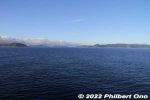
Cruising off Amami-Oshima island, Kagoshima, Japan.
|
|

Northern coast of Amami-Oshima island, Kagoshima.
|
|
|
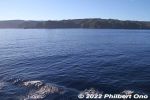
Northern coast of Amami-Oshima island, Kagoshima.
|
|
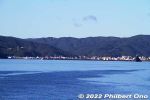
Approaching Naze Port, Amami-Oshima's main port for cruise ships and ferries in a natural inlet on the northern coast of the island. Also called Naze Shinko Port. Served as the island's main trade port since olden times.
|
|
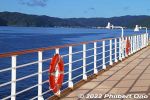
Getting closer to Naze Port.
|
|
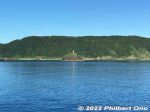
Entering Naze Port, passing by Tachigami Lighthouse island.
|
|

Naze Port Tachigami Lighthouse is on a small, pyramid island at the entrance of Naze Port. Lighthouse built in 1937 was used until 2016. Made famous by local folk songs. 名瀬港立神灯台
|
|
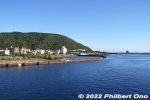
Naze Port is about halfway between Kagoshima Port (383 km away) in Kyushu and Naha Port (331 km away) in Okinawa. Designated as an Important Harbor in Japan. Fine natural harbor.
|
|
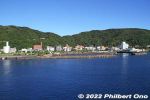
Naze Port consists of four dock areas. From Naze Ports, there are boats or ferries going to Kagoshima Port, Okinawa, Osaka, and the other Amami islands.
|
|
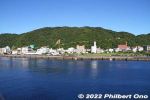
Approaching Naze Port's Nagahama area. 名瀬港 長浜地区
|
|
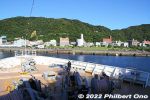
Cruise ship approaching Naze Port's Nagahama area on Amami-Oshima island.
|
|
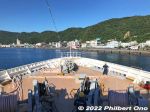
Naze Port's Nagahama area on Amami-Oshima island was prepared for 80,000-ton cruise ships in 2004.
|
|
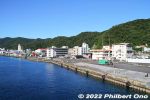
Naze Port's Nagahama dock where cruise ships dock. It's 280 meters long and 10 meters deep. 名瀬港 長浜地区
|
|
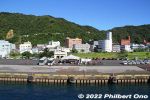
Naze Port's Nagahama area on Amami-Oshima island.
|
|

Naze Port's Nagahama area on Amami-Oshima island awaits our cruise ship with tour buses and gift shop tent.
|
|
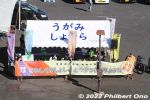
Welcome sign in local dialect at Naze Port's Nagahama area on Amami-Oshima island.
|
|

Tugboat named Ayahashi helps our cruise ship dock at Naze Port.
|
|
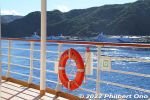
Japan Coast Guard ships are also moored at Naze Port, Amami Oshima.
|
|

Cruise ship at Naze Port pointed at Tachigami Lighthouse island. The small island is like the port's good luck charm.
|
|
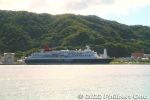
Cruise ship at Naze Port, Amami-Oshima.
|
|

Cruise ship at Naze Port, Amami-Oshima.
|
|
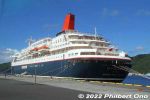
Nippon Maru cruise ship at Naze Port, Amami-Oshima.
|
|
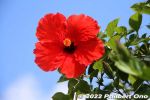
Hibiscus on semitropical Amami-Oshima island, Kagoshima.
|
|

Roadside scenery on Amami-Oshima island, Kagoshima, Japan.
|
|

Roadside scenery on Amami-Oshima island, Kagoshima, Japan.
|
|

Scenic coast on Amami-Oshima island, Kagoshima, Japan.
|
|

Tropical flora on Amami-Oshima.
|
|
|

Coastal scenery on Amami-Oshima island, Kagoshima, Japan.
|
|

Opened in Sept. 2001, Amami Park was built by Kagoshima Prefecture on the site of the old Amami Airport. It has become one of the island's major tourist attractions. On this map of Amami Park, it's easy to see where the runway was.
|
|
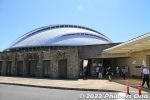
Main entrance to Amami Park. First go through the Amami no Sato dome housing the Event Space, Information Space, and Exhibition Hall.Adult admission ¥650 for both Amami no Sato and Isson Tanaka Museum. Open 9 am–6 pm (until 7 pm in July–Aug.) Closed on the first and third Wed. of the month. (Open if a national holiday and closed on the next day instead.) Open every day during April 29th to May 5th, July 21st to August 31st, and December 30th to January 3rd.
https://amamipark.com/
|
|

Amami Park has the Isson no Mori tropical garden area which is free admission, but other facilities charge admission like the Exhibition Hall and Amami Theater. Isson is the name of a local painter.
|
|
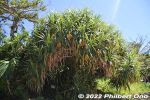
Amami Park has a garden area named "Isson no Mori" with many tropical plants. This is an Adan tree. (Pandanus odoratissimus)
|
|
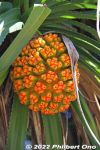
Adan アダン (Pandanus odoratissimus)
|
|
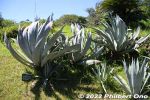
Agave americana 'Marginata' (Variegated Century Plant). Ornamental plant. リュウゼツラン
|
|
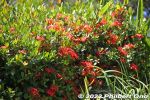
Ixora "Super King"
|
|
|
|
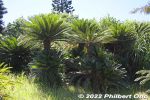
Sago palms native to Amami and Okinawa. ソテツ
|
|
|
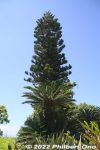
Amami Oshima Park
|
|
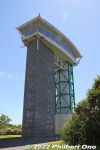
The park also has this lookout tower (Tenbodai) with fine views of the area. It might have been the old airport control tower. 展望台
|
|
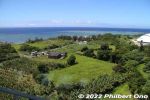
View from the lookout tower.
|
|
|
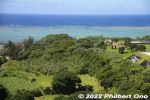
View from the lookout tower, Amami Park.
|
|
|
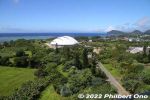
View from the lookout tower. The Amami no Sato dome (white) can be seen.
|
|
|

Amami-Oshima coastal view.
|
|
|
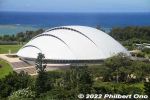
Amami no Sato shell-like dome.
|
|
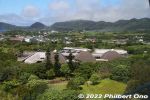
Tanaka Isson Museum can be seen.
|
|
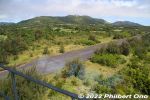
Rear view of park.
|
|
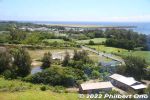
The new Amami Oshima Airport can be seen in the distance.
|
|
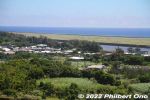
The new Amami Airport's runway can be seen. Amami Park is a short drive from the airport.
|
|
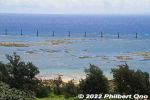
Runway landing lights in the ocean.
|
|
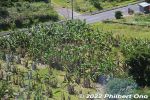
Banana patch
|
|
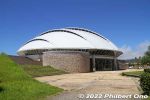
Amami no Sato dome housing the Event Space, Information Space, and General Exhibition Hall.
|
|

Amami no Sato's Island Information Space explains about Amami Oshima.
|
|
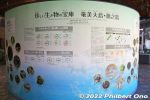
Amami no Sato's Island Information Space explains about local flora and fauna.
|
|
|

Amami no Sato's Information Space explains about local flora and fauna.
|
|
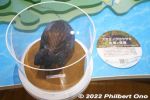
Model of Amami Oshima's endemic Amami Kuro-usagi rabbit. Short ears and dark fur.
|
|

Amami no Sato's indoor stage and event space inside the dome. There's also the small Amami Theater showing a short film about Amami. イベント広場
|
|
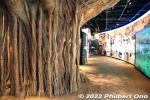
Amami no Sato's Exhibition Hall. Admission charged. It's a small local museum explaining local flora, fauna, history, and folk culture.
|
|
|
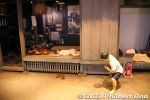
Amami no Sato's Exhibition Hall includes a reconstructed local home.
|
|
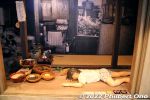
Realistic and humorous mannequins.Kagoshima Amami Oshima park
|
|

Summer day in Amami.
|
|
|
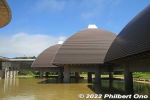
Isson Tanaka Museum is an art museum showing his paintings. Isson Tanaka (1908–1977) was a painter from Tokyo who moved to Amami at age 50. Photography inside the museum is not allowed. 田中一村記念美術館Isson lived on Amami from 1958 until his death in 1977. He painted Amami's flora and fauna. The museum has about 450 of his works and displays about 80 of them at a time. Museum buildings resemble the local Takakura storehouse for grains. Amami-Oshima, Kagoshima.
|
|

Entrance to Amami Resort Basyayamamura, a resort hotel and restaurant on the southern shore of the northern part of the island. Short drive from the airport.
|
|
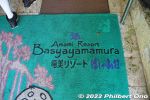
We had lunch here. Address: 鹿児島県奄美市笠利町用安1246-1
|
|
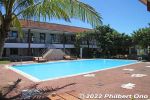
Amami Resort Basyayama-mura pool. Website: basyayama-mura.com
|
|
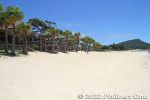
Amami Resort Basyayama-mura restaurant terrace right on the beach..
|
|

Amami Resort Basyayama-mura has a nice, white-sand beach.
|
|
|
|
|
|
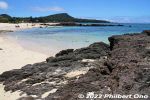
Lava rock outcropping also on the beach.
|
|
|
|
|
|
|
|
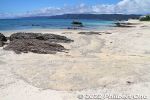
This beach had pumice rocks (軽石) creating artistic patterns on the sand. They were still washing up on the beach in June 2022, but not as much as in Oct. 2021 when they clogged harbors and blanketed beaches.
|
|
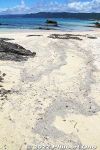
On Amami-Oshima, Kagoshima, Amami Resort Basyayama-mura beach had pumice that came from an undersea volcano (Fukutoku-Okanoba) erupting near the Ogasawara islands (way south of Tokyo).
|
|
|
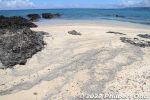
Pumice rocks are small, lightweight, porous pebbles. Floats on water. Saw it for the first time here.
|
|
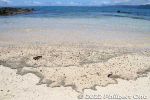
In 2021, an army of volunteers took weeks to clean up Okinawan and Amami beaches. It was almost like cleaning up an oil spill. Glad the problem has subsided.
|
|

Pumice pebbles on a beach in Amami-Oshima, Kagoshima, Japan.
|
|
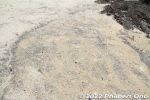
Someone had recently raked or cleaned up the pumice.
|
|

Basha-yamamura restaurant is a great place for lunch. The terrace has ocean views. This is the cheapest dish on the menu, Tonkotsu udon noodles for ¥1,000. 豚骨うどん
|
|

Restaurant lunch menu. Mainly seafood and local cuisine. Open 11 am to 9 pm.
|
|
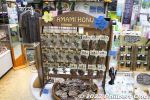
Gift shop
|
|
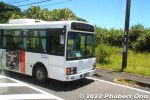
Local bus on Amami Oshima.
|
|
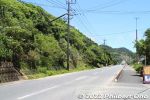
Amami Oshima is slightly larger than the Hawaiian island of Molokai.
|
|
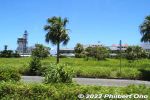
Passing by Amami Oshima Airport.
|
|
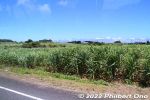
Sugar cane on Amami Oshima.
|
|

Way to Cape Ayamaru lookout point.
|
|
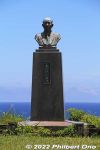
Bust of Nagano Yoshitatsu (1898–1984 永野芳辰) at Cape Ayamaru. Nagano was a Japanese government bureaucrat who helped to revert Amami islands back to Japan in 1953. He was born and raised on Amami Oshima. Later became governor of Kochi Prefecture.
|
|

Photo spot at Cape Ayamaru.
|
|
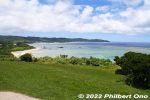
Cape Ayamaru scenery.
|
|
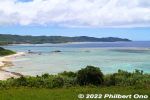
Northern coast of Amami Oshima as seen from Cape Ayamaru.
|
|
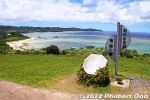
Cape Ayamaru sign and photo spot, Amami Oshima, Kagoshima.
|
|

Cape Ayamaru sign and photo spot.
|
|
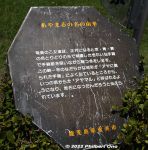
How Cape Ayamaru got its name.
|
|
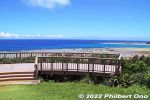
Lookout deck at Cape Ayamaru with views of the coral reef and ocean. Amami Oshima, Kagoshima.
|
|

Lookout deck at Cape Ayamaru shows a beautiful aqua-blue ocean.
|
|
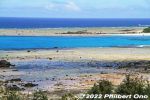
Lookout deck at Cape Ayamaru shows a beautiful aqua-blue ocean.
|
|
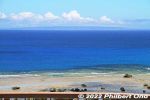
Lookout deck at Cape Ayamaru shows a beautiful blue ocean beyond the coral reef.
|
|
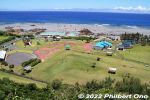
Recreational park down below from the lookout point on Cape Ayamaru.
|
|
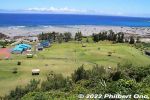
Recreational park down below from the lookout point on Cape Ayamaru.
|
|
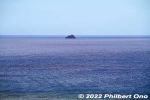
Tonbara Rock as seen from Cape Ayamaru. トンパラ岩
|
|

Local buses stop here too, not often though.
|
|
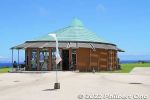
Gift shop.
|
|
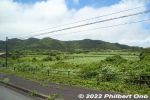
Roadside scenery on Amami Oshima.
|
|
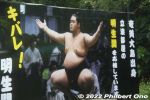
Street sign promoting sumo wrestler Meisei who is from Amami Oshima. He belongs to Tatsunami Stable. 明生関
|
|
| 1486 files on 6 page(s) |
1 |
 |
 |
 |
|